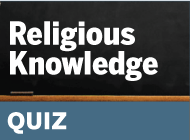Preface
In his 2007 book, Religious Literacy: What Every American Needs to Know – And Doesn’t, Boston University professor Stephen Prothero wrote that “Americans are both deeply religious and profoundly ignorant about religion.” To support his contention, Prothero offered many compelling anecdotes and some isolated findings from public opinion polls. He also cited a few studies about the extent of biblical literacy among young people. But, as he discovered, there was no comprehensive, national survey assessing the general state of religious knowledge among U.S. adults.
To address this gap, the Pew Research Center’s Forum on Religion & Public Life set out to gauge what Americans know about their own faiths and about other religions. The resulting survey covered a wide range of topics, including the beliefs and practices of major religious traditions as well as the role of religion in American history and public life. Based on an analysis of answers from more than 3,400 people to 32 religious knowledge questions, this report attempts to provide a baseline measurement of how much Americans know about religion today.

How much do you know about religion?And how do you compare with the average American? Take our short, 15-question quiz to find out. |
Readers should bear in mind some key limitations of the survey. With a few notable exceptions – such as a study by Rodney Stark and Charles Y. Glock of Northern California churchgoers in 1963 and some Gallup questions from the 1950s – the Pew Forum’s staff found little historical data on levels of religious knowledge in the U.S. public. As a consequence, we cannot say with assurance whether Americans in 2010 know more, or less, about religion than prior generations did. Before we put any religious knowledge questions to the public, we also decided that, no matter what the results, we would not give the public an “A,” an “F” or any other grade because we have no objective way of determining how much the public should know about religion. Moreover, we could have designed harder questions, or easier ones. As it happens, through a combination of good survey design and good luck, the results were an almost perfect bell curve in which the average score was exactly half of the 32 possible correct answers, and very few people got all questions right or all questions wrong. Readers can decide for themselves whether this justifies Prothero’s conclusion or not.
In designing the survey and analyzing the results, we were fortunate to be able to draw on the expertise of an exceptional panel of advisers, including Prothero, Marilyn Mellowes of WGBH-Boston and John Green of the University of Akron. We also received invaluable help from colleagues at the Pew Research Center, particularly Scott Keeter and Leah Christian, who shared their experience in conducting knowledge surveys. We are grateful to David Dutwin and Robyn Rapoport of Social Science Research Solutions for their advice and diligent work on methodological issues. Our friends at WGBH Television in Boston encouraged this survey and collaborated with us in releasing it (along with WGBH’s three-part PBS documentary, “God in America”) to the public at a Sept. 28, 2010, symposium generously hosted by the Religious Freedom Education Project at the Newseum in Washington, D.C. We also received insightful advice on portions of this report from E.J. Dionne of the Brookings Institution and Charles Haynes of the First Amendment Center. And, most of all, we wish to thank our polling consultant, Mike Mokrzycki, for his professional expertise, project management skills and unfailing good cheer. With all this help, any failings of this report are, needless to say, ours alone.
Luis Lugo, Director Alan Cooperman, Associate Director, Research
Photo credit: Eric Swanson/Corbis




